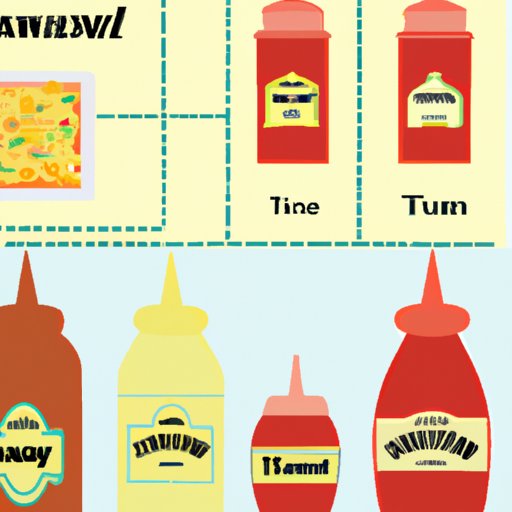Introduction
Ketchup is one of the most popular condiments in the world. It’s found on tables everywhere, from fast-food restaurants to family dinner tables. But have you ever wondered where this beloved condiment originated? In this article, we’ll explore the history of ketchup and investigate the mystery surrounding its invention.
A Historical Account of Ketchup: The Evolution and Invention of the Condiment
The story of ketchup begins in ancient China, where a fish sauce called “ke-tchup” was used as a condiment. This fish sauce was made by fermenting fish with salt and spices. Over time, this recipe for fish sauce spread throughout Asia, eventually reaching Europe in the 17th century.
By the 18th century, the recipe for fish sauce had been adapted to include tomatoes. This new tomato-based sauce became popular in Europe and Asia, and various recipes for it began to appear in cookbooks. In the 19th century, ketchup became an even more popular condiment, with recipes appearing in cookbooks all over the world.
Exploring the Origin Story of Ketchup: From Ancient Fish Sauce to Modern-Day Tomato Ketchup
The first known recipes for tomato ketchup were published in the early 1800s. These recipes varied in ingredients and preparation techniques, but they all included tomatoes as the main ingredient. As the popularity of tomato ketchup grew, manufacturers began to industrialize its production. This allowed them to produce ketchup in large quantities and distribute it more widely.
In the late 1800s, the H.J. Heinz Company emerged as a major player in the ketchup industry. They developed a recipe for tomato ketchup that was made with higher quality tomatoes and fewer additives. This recipe quickly became the standard for ketchup production and is still used today.

Taste Test: How Ketchup Became a Staple of American Cuisine
In the 1950s, fast food restaurants and burger chains began to spring up all over the United States. These restaurants embraced ketchup as an all-purpose condiment, using it to dress burgers, fries, and other menu items. This increased demand for ketchup, and soon it became a staple of American cuisine.
As ketchup’s popularity grew, so did its culinary uses. It was no longer just a condiment for burgers and fries; it began to be used in recipes for sauces, marinades, and dressings. Ketchup also gained popularity as a dipping sauce for snacks like french fries and potato chips.

Innovation in Food Science: How Ketchup Changed the Way We Eat
The development of ketchup has been heavily influenced by food science. In the 1960s, preservatives and artificial flavors were added to ketchup to extend its shelf life and enhance its flavor. In the 1970s, modified starch was introduced to thicken ketchup and give it a smoother texture. Today, there are dozens of varieties of ketchup available, ranging from classic tomato ketchups to more exotic flavors like curry and sriracha.

Ketchup Through the Ages: A Look at How the Popular Condiment Has Evolved
Ketchup has evolved over the centuries, and different regional variations have emerged. For example, in the United Kingdom, ketchup is often served with chips (french fries). In Japan, ketchup is used in a variety of dishes, including omelets and spaghetti. In recent years, health-conscious consumers have sought out healthier versions of ketchup, such as those made with organic tomatoes or reduced sugar. Social media has also played a role in ketchup’s evolution, with people sharing their favorite recipes and ketchup-inspired creations.
The Secret History of Ketchup: Uncovering the Mystery of Its Invention
The true origin of ketchup is a subject of debate. Some believe it originated in China, while others believe it was invented in England. There have even been claims that the recipe for ketchup was stolen from a Chinese scholar and then sold to a British company. Whatever the truth may be, one thing is certain: ketchup has become a beloved part of our culture.
Conclusion
Ketchup has come a long way since its ancient fish sauce origins. It’s gone from being a regional condiment to a ubiquitous part of our diets. Its popularity has led to the development of new varieties and healthier versions, as well as the emergence of regional variations. Despite the mystery surrounding its invention, one thing is clear: ketchup has become an essential part of our lives.
(Note: Is this article not meeting your expectations? Do you have knowledge or insights to share? Unlock new opportunities and expand your reach by joining our authors team. Click Registration to join us and share your expertise with our readers.)
